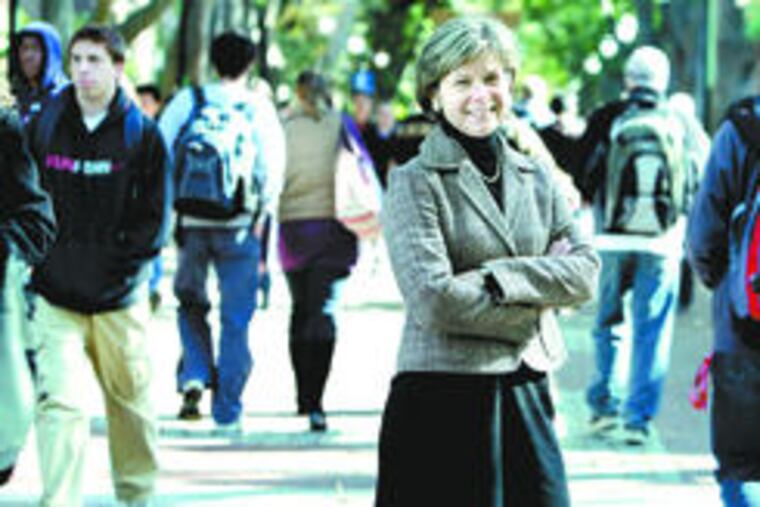
The Philadelphia region's biggest employers include a diverse list of drug and chemical makers, military contractors and specialized financial firms.
At the top are the universities and their affiliated hospital networks - Jefferson, Penn and Temple - nonprofit groups whose size and growth make them major economic players.
In the 10 counties stretching from New Hope to New Castle, Del., drugmaker Merck & Co. Inc. and military electronics contractor Lockheed Martin Corp. each employs more people than Wal-Mart Stores Inc., Supervalu Inc.'s Acme Markets or any other retailer. Wal-Mart is the largest private employer in the United States and in Pennsylvania as a whole.
At least 80 publicly traded companies and dozens of private and nonprofit institutions employ more than 1,000 people each in the region, according to an Inquirer survey.
Overall, one-third of Philadelphia-area workers are in education, health, professional or business services. Nationwide, it is one in four.
Government, including the military, employs 16 percent of U.S. workers. Here, it is just 12.6 percent.
Manufacturers such as DuPont Co., Boeing Co., Rohm & Haas Co. and General Electric Co. remain major local employers, and Germany's Siemens AG has consolidated a string of medical-device-makers into one of the region's biggest tech employers. But overall, factories employ less than 8 percent of the regional workforce, compared with more than 10 percent nationwide, according to Bureau of Labor Statistics data for mid-2007.
Another German firm, business-software firm SAP AG, competes for local talent with Unisys Corp., a pioneer computer-maker that became a government-data manager, SunGard Data Systems Inc., a privately held leader in financial-transaction software, and a few other big-name tech firms. But overall, information services accounts for just 1.9 percent of local jobs, compared with 2.2 percent for the nation as a whole.
Accounting, law and other professional services are overrrepresented; leisure and hospitality are underrepresented, compared with the national averages. Construction is also "underweight," but that is typical in metropolitan areas, said economist Timothy Schiller of the Federal Reserve Bank of Philadelphia.
Merck is the largest of half a dozen major and more than a dozen smaller drug and biotech companies, based mostly along the U.S. Route 202 corridor from Merck's Spring House research center to AstraZeneca P.L.C.'s brick U.S. headquarters in Fairfax, Del. They complement the big concentration of medical schools and research centers in Philadelphia.
Not even Merck employs as many people as the major universities and their affiliated hospitals. Some local bankers suggest that the schools are so powerful, their chief executive officers are the region's most influential people.
The schools, besides ranking as the region's largest individual employers, are also big spenders on construction and development, said Ann Lanahan Gill, who heads the Philadelphia-based Wachovia Corp. team that lends to nonprofit organizations around the Northeast.
Philadelphia-area colleges plan $10 billion in construction over the next five years, with the University of Pennsylvania accounting for the largest share, Gill said.
As an investment banker for the former Philadelphia National Bank, Gill used to work with the region's large financial-services sector, including companies such as Ace Ltd., Cigna Corp., General Electric Capital Corp., Lincoln National Corp., Prudential Financial Inc. and the Vanguard Group Inc. Now, in a typical day, "I'll meet with a university president, a labor leader, a nun. Then in the evening I go out to a cultural event."
That does not mean she has left her corporate contacts behind; to the contrary, her new role has made them more valuable and given her greater access to nonprofit business. "With for-profit companies, you deal with the chief financial officer. Maybe with the CEO. Nonprofits, you also deal with the boards, who are the business leaders in this city."
Working those networks, sometimes with help from Aramark Corp. CEO Joseph Neubauer, a Wachovia director, has helped Gill's group arrange financing for deals such as Penn's planned expansion along the Schuylkill, and Episcopal Academy's $200-million-plus campus near Newtown Square.
Those relationships work both ways: At Neubauer's suggestion, Wachovia also stepped up to guarantee financing for the privately led, successful $60 million campaign to buy Thomas Eakins' painting The Gross Clinic and keep it in Philadelphia after Jefferson tried to sell it to a Wal-Mart-backed Arkansas museum and the National Gallery of Art last year.
Gill said a generation of new university presidents, including Amy Gutmann at Penn and Ann Weaver Hart at Temple University, along with new Kimmel Center head Anne Ewers and other arts executives, form an "attractive market" of well-connected leaders and clients.
"I spent eight years living on USAir pushing deals and IPOs," Gill said. "I enjoyed that. But it's a lot more fun to be able to work in Philadelphia, where I'm from, and really feel like I'm making a contribution to the community."
» READ MORE: Top 100 Discussion Forum
EndText